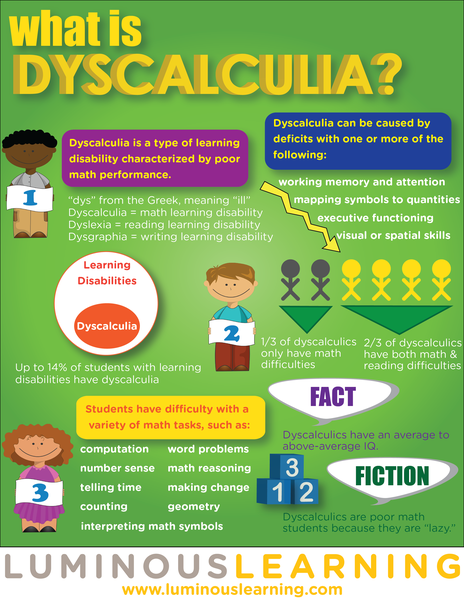Mathematics can be affected by learning disabilities – as frequently, according to some, as language skills are affected.
Types of Mathematical Learning Disabilities
- difficulty learning basic number facts
- difficulty with arithmetic/calculation
- difficulty with symbols
- visual-Spatial difficulties
Additionally, learning problems that are not directly related to math can and will impact on mathematics. Language skills are required for many mathematical problems, as are executive functions like planning, organizing, and self-reflection.
What is Dyscalculia?
Dyscalculia is a math learning disability that impairs an individual’s ability to learn number-related concepts, perform accurate math calculations, reason and problem solve, and perform other basic math skills. Dyscalculia is sometimes called “number dyslexia” or “math dyslexia.”

Symptoms
- Difficulties with processing numbers and quantities, including:
- Connecting a number to the quantity it represents (the number 2 to two apples)
- Counting, backwards and forwards
- Comparing two amounts
- Trouble with subitizing (recognize quantities without counting)
- Trouble recalling basic math facts (like multiplication tables)
- Difficulty linking numbers and symbols to amounts
- Trouble with mental math and problem-solving
- Difficulty making sense of money and estimating quantities
- Difficulty with telling time on an analog clock
- Poor visual and spatial orientation
- Difficulty immediately sorting out direction (right from left)
- Troubles with recognizing patterns and sequencing numbers
Finger-counting is typically linked to dyscalculia, but it is not an indicator of the condition outright. Persistent finger-counting, especially for easy, frequently repeated calculations, may indicate a problem.
Calculating errors alone are also not indicative of dyscalculia – variety, persistence, and frequency are key in determining if dyscalculia is present.
Dyscalculia At a Glance
| Comorbidity with ADHD | · Dyscalculia is present in about 11 percent of children with attention deficit hyperactivity disorder (ADHD or ADD). |
| Suggestive Symptoms | · Slow to develop counting and math problem-solving skills · Trouble understanding positive versus negative value · Difficult recalling number sequences · Difficulty computing problems · Problems with time concepts · Poor sense of direction · Difficulty completing mental math |
| Professional to See | Evaluation should be conducted by a school psychologist or special education professional. School supports may be provided by special education professionals and/or your child’s classroom teacher. |
| Treatments & Medications | · There is no medication to treat learning disabilities · Your child may qualify for an IEP to receive special-education services including math supports |
| Recommended Resources | · LDAAmerica.org · NCLD.org · LDOnline.org · WrightsLaw.com · The Misunderstood Child, Fourth Edition: Understanding and Coping with Your Child’s Learning Disabilities (#CommissionsEarned) by Daniel Ansari, Ph.D. |
References:
https://www.ldao.ca/introduction-to-ldsadhd/snapshots/mathematics-and-lds-a-snapshot/
http://www.teachingwithtlc.com/2013/04/is-your-child-having-difficult-time.html




Leave a Reply
You must be logged in to post a comment.